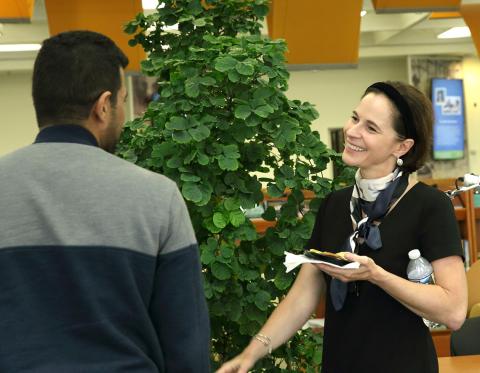Belkaid Describes Intimate Man-Bug Partnership

Photo: Bill Branson
Time was when you had to go outside your own skin to confront “the other.” That all went out the window when the human microbiota—our passengers throughout birth, life and death—was discovered to exert an enormous effect on health.
According to Dr. Yasmine Belkaid, who gave the annual Rolla E. Dyer Lecture on Apr. 26, the microbes that inhabit us—from the skin-side in—contribute 100 times the effect on our physiology as our own genome.
Belkaid, who is director of the Microbiome Program at NIAID and chief of the mucosal immunology section in the Laboratory of Parasitic Diseases, spoke on “The primary shield: role of our microbes in health and diseases.”
Humans have co-evolved with their microbial partners, she explained. Owing to the technological advances of the past 10 years, scientists have determined the deepening extent to which microbiota control host physiology.
Belkaid said the microbiota is involved in all aspects of the human immune system, from development, to function, to tuning. “Cross-talk between the microbiota and the host is all-inclusive,” she discovered.
Paradoxically, a large number of microbes capable of causing disease are normal constituents of the microbiota, she said. Further, “The microbiota can promote pathogen transmission and the pathological consequences of infection.”
It is as if the yin and yang of microbiota recapitulate, physiologically, man’s capacity for good or evil.

Photo: Bill Branson
Belkaid said human microbiota provide colonization resistance against a wide range of pathogens. Gut microbiota can stimulate cytokines that promote immunity, she added. “Our response to flu and malaria are controlled by microbiota.”
Those who question the power of gut microbiota to resist pathogens should consider the efficacy of fecal transplant in cases of Clostridium difficile, which now approaches 95 percent, Belkaid said.
Though her field has been preoccupied initially by the gastrointestinal tract, Belkaid said, the skin is now a major topic of interest, owing largely to work by NHGRI’s Dr. Julie Segre, whose microbial genomics section performed the first skin microbiome survey.
“Skin harbors a complex microbiota,” said Belkaid. Nutrients present at various human surfaces determine what kind of microbe grows best there.
The robust dialogue between tissues is not limited to the self, either. “Families share microbiota with their dogs,” Belkaid observed.
“There is much more to be learned about the relationship between microbes and the immune system,” she concluded, “everything from pathways to molecules.” She predicted that mining the microbiota is likely to yield a rich harvest of future therapeutics.
In other words, the more we learn about the generosity of our passengers, the healthier—and possibly less lonely—we may be.—Rich McManus
